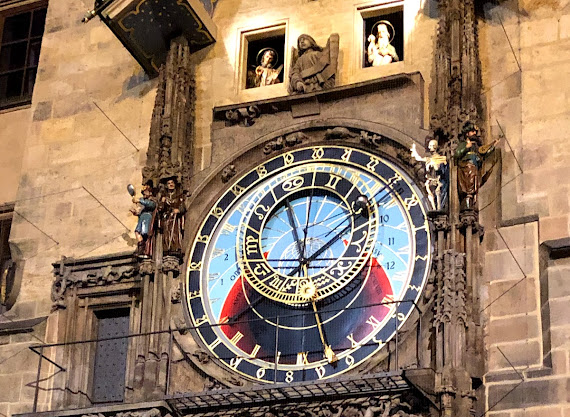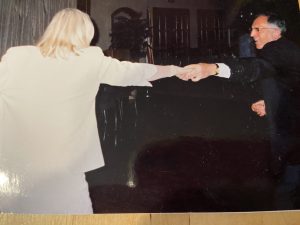
Orwell’s dramatic book of the future is truly a tragic daydream.
My future derives from a similar journey, not a frightful one.
It all began with my birth. My mother, Rose, was disappointed that she birthed a male child—as documented by my birth certificate. My first photograph showed me as a three-year-old child in the driveway dressed in a skirt.
Rose used terms of endearment that had a feminine flavor. Etymologically, the “ie” suffix for boy’s names gave the feeling that the boy was childish, less male, or even nongender. My first picture in the local newspaper identifies me as Dickie Kagan, a helpless child on a tricycle who was kidnapped.
I am now only piecing together the meaning and significance of her most common term of endearment—Dicksala. I am not sure of its origin, but I have long daydreamed about its influence. The suffix “sala” is based on the Hebrew and Yiddish way to emphasize the femineity of a name. “Sala” is also a derivative of the name “Sarah.” From my study of the Holocaust, I learned that “Sarah” was the name Nazis used for all Jewish females. This discovery increased my sense of identifying with my feminine side.
I have spent time daydreaming about my birth name vs. my nickname. It has led me down a path that I have been bequeathed a second nature. I have turned this feeling into searching for my dual identity.
In high school, I learned to dance with a male friend. In my parent’s living room, we listened to music while holding each other—sharing the male and female roles. The New Yorker dance supplied the excitement and pleasures of twirling, balancing, and embracing. Consequently, I became an excellent dancing partner at parties who understood both the male and female roles. Unfortunately, perhaps, I never adapted to the modern individualism of dancing as a form of gymnastics.
Rejection of the binary male-female division fosters identity with women, gays, lesbians, and trans people. My students, both male and female, have often celebrated me as a father figure. Often there was a family-like relationship. Several times I roomed with a former student in her apartment in Taiwan. During those times, I cleaned the house and helped with food preparations. Years later, my daughter stayed with her. My former student told my daughter that I was a great roommate.
In my research, I have had empathy for abused women, especially for prostitutes. For instance, I discovered that Thai prostitutes fled from their oppressive families in rural areas to the city where they formed a bond with other prostitutes in the brothels. Here, they lived with other women, learning skills like sewing or knitting between their pecuniary employments. They often became literate which led to confidence and freedom to engage in other occupations.
While teaching about the Japanese comfort women during WW2 who were kidnapped into prostitution for the military, I organized specific activities to promote understanding and consciousness of their plight. After the war, Comfort Women published poetry and stories about their dehumanization. These memoirs expressed exceptional aesthetic sense and strategies for self-preservation. We read them aloud. I felt that this pedagogy was an excellent substitute for a historical narrative, as well as a means to promote empathy and sensitivity. I tried to teach my students to learn from these heroic achievements to survive with honor and health. The moral: out of the darkness, there can be light.

In Taiwan at an LGBT parade – the sign reads “No matter what you are called, heaven still loves you very much”
In my sparse subbing as a Japanese language instructor, I was required to teach a story about two foreigners—male and female—who learned to live and speak in Japan. The narrative was full of dialogue, as would be expected in a language class. The problem is that the pronunciation of the same word, or composition of the sentence changes according to the male or female speaker. For instance, after WW2, American soldiers and government officials learned Japanese from their female language teachers. Behind their backs, the Japanese would laugh because they sounded like women. So, I invited a female Japanese speaker to teach the students how women would read female dialogues. I read the male and she read the female dialogues with differing tones and added expressions.
In sum, Orwell’s thirteenth hour invites me to spend time daydreaming into the realm of a complementary identity.




Your investigation into the duality of male/female persona is most intriguing, Richard. As the mother of a trans daughter, it holds special significance for me. You are quite sensitive to this yourself.
Betsy: My essay lost a paragraph which related to my title picture of a clock.
I was associating myself with a “clocker.” This is a person who acts in the opposite gender. In literature, this is a woman who identifies her writings and often names with a male, or a transgender person.
The clock in the essay was a symbol of this: moving from 12 to 13.
It is interesting how the discussion of gender identity has evolved, with a lot more people recognizing the masculine and feminine aspects of themselves in different proportions. Native Americans have an apt name—two spirit. I think it is a gift to be more balanced and to be able to see the world through both eyes.
Khati: Thank you. I would add to the Native American perspective, the considerations of Yin and Yang where each grows into and out of the other.
r
Thanx Richard for your often intriguing take on the prompt, and for another peek at your intriguing life at home and the times you’ve lived and worked abroad!
You presented some interesting observation about names; their forms and the meanings they acquire.
In my Dad’s family, all of the (numerous) brothers were referred to in similar fashion; Petey (my father), Dickie, Sally, Mikey, Vinnie, Franky. At least Thomas missed out on being Tommy-ie. Stella and Rose remained unaltered, but Teresa became Terri. My father’s first son (with his first wife) was Peter Jr, so he became “Peter Boy” (well, more accurately, “Peetah-boy”). He has been Peetah-boy throughout his entire adult life. This is very common among that generation of Italian-Americans; I have no idea if it still goes on.
More recently, my Jewish BFF has referred to me as Dave-a-lah or Bubbaleh since college. Also Schmuck, Putz, Scrum and Rambler (the last two being just between he and I).
I always thought the opening sentence of 1984 to be utterly brilliant. To me it immediately suggests a world out of kilter, strange, disquieting. I doubt that it has that effect upon people who use a 24 hour reckoning, not AM and PM like us. Also, do cuckoo clocks in such countries strike 24 times at midnight?
Dear Dave:
Thank you for your response. It does help me to consider writing more carefully and with more clarity.
I regret the confusion with the clock quotation from Orwell. The original meaning of this reference was edited out by my daughter, and without my careful rereading.
I used the reference to the Clock striking 13 to symbolize my own identity.
Midway through my essay, I referred to myself as a clocker—a writer who changes gender, or a transgender person. The purpose of this conceit is that I often associated myself with the feelings or concerns of females and gays.
Concerning nicknames, I began the sentence with the qualification of being epistemological in my thoughts on nicknames. I was not a social scientist here, which I am in my profession where I use data, interviews, and at times statistics to make a point. I was using my own experience or my daydreams.
Perhaps I was not specific enough to explain that my use of the suffix may not correspond to the accepted meaning. Again, I was talking about myself and not a professional dictionary definition.
I have no problem with terms of endearment among friends. But sometimes the same word can be endearing and racist or prejudicial. E.G. the n-word used by a white has a different meaning than the same word used by an African American to another African
American. Or “white nationalist” can have a patriotic meaning or an authoritarian one. It depends on the context. Bubbala is fairly neutral. But kike is not even though it originated as a descriptive word about the illiterate Jew, it became a pejorative for every Jew.
I used the symbol of 13 to teach my students to take on a different identity. Two cases follow:
In my freshman class I asked the students to describe the room. Most men described the furniture, the windows, the colors, the blackboard. Most women describe their feelings—excitement, the newness, the change from a high school classroom to a University. (I found a few men who sounded like a woman, and had sisters). Then I asked them to describe the room or think of a design, for a blind person, a left-handed person, a minority, a handicapped person, or someone who was brought up in a feng shui culture. The idea was to have them identify with a person different from their own identity—just one piano note or outside clock number away.
I asked them to identify with the WW2 Comfort Women for Japanese soldiers through various personal exercises. My daughter deleted that paragraph.
I learned from your comments to reread edits carefully, and to provide more information and meaning to what I write.
I love this group because it knocks me out of my court. And encourages us to comment on each other’s writing.
I look forward to your comments on my next prompt.
I just went in and edited my comment where I mention 24 hour time reckoning vs AM/PM, as I had actually gotten it backwards! Ah, the power of the Admin!
Alan has never referred to me by any anti-Italian*# slur, nor I to him as anything remotely racist, close friend or no. I’ve long labored to keep that taint out of my speech, to the extent that I don’t even use “bitch” as a verb. If Alan didn’t speak some Yiddish, he’d use the English equivalents because he is Alan. Just a couple of Jersey boys who are as close as any brothers. He also calls me putzmeister.
* Lots of luck on anti-Norwegian slurs. We are so dull we have never even generated any decent insults!
# Well, there is the occasional Mob reference, but everyone in NJ makes those.
Nicely done look at gender identity and its complexities, Richard. Thanks for sharing.
Richard, I have long recognized that the old Mars/Venus paradigm for men and women is sorely lacking. I’ve had relationships with two women in my life who have been driven much more by rational, practical thought than emotions, whereas I tend more toward the latter, despite being a professional academic. I’ve stopped associating any of that with gender identities. In both those relationships, we were all comfortable in our own traditional skins.
Thanks. Yes, the binary view of life and existence is oppressive.
Being loved by heaven – nice.
It still takes courage for men to affirm their feminine or nonbinary sense of the world. Good for you for embracing that.
I got a bit confused by the Orwell reference without explanation, so I’m pleased I was able to read that exchange between you and Dave. Nice to get down into the weeds in examining a piece of writing.
Am glad you found the meaning for that reference. In my piece on Dawn, I looked at it as promising and the opposite–execution.
I really wanted to cite Proust, but thought that was way too academic.